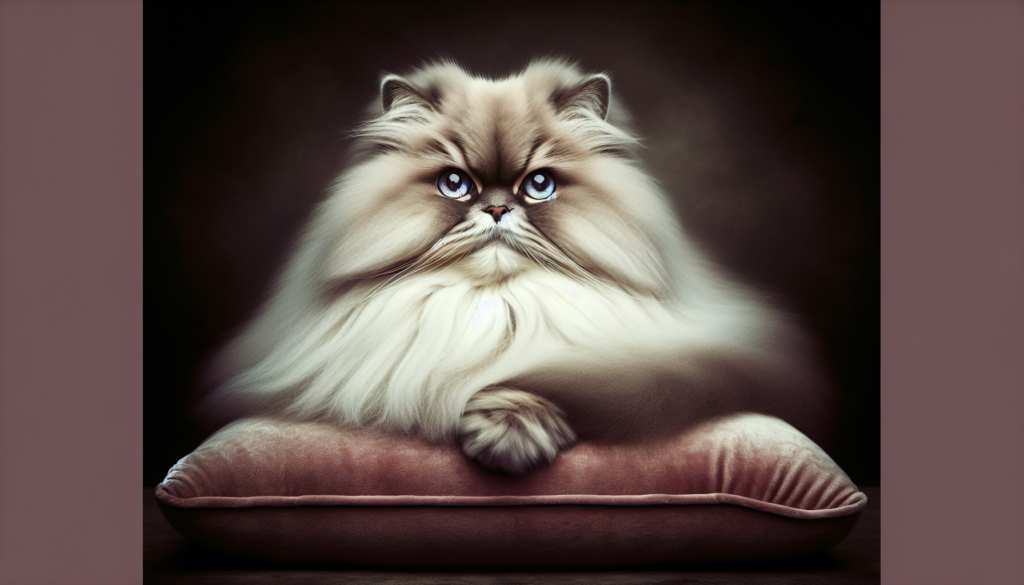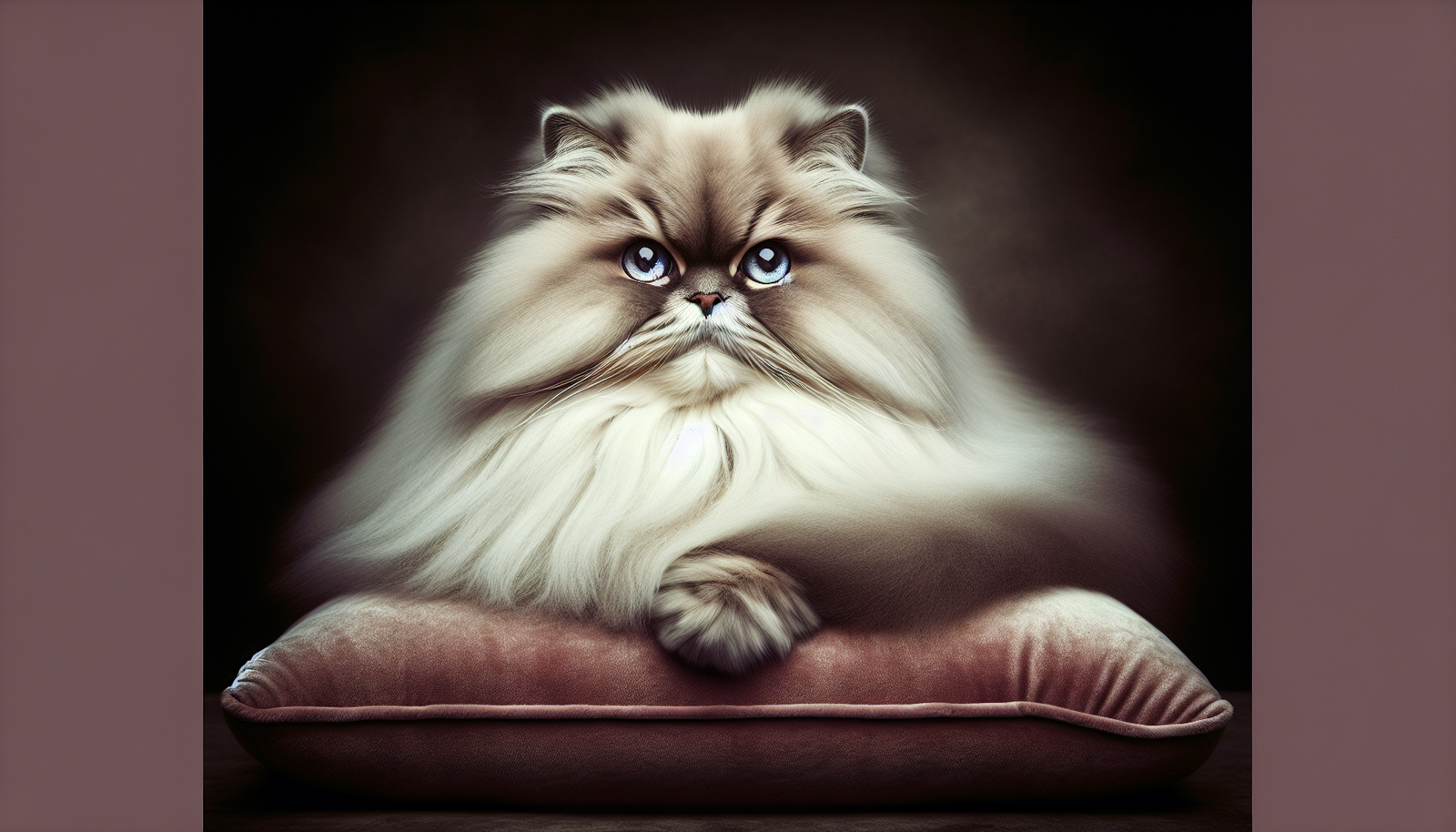Persian cats are renowned for their luxurious, long coats and distinctively adorable faces. If you’ve ever been curious about the weight of these majestic felines, you’re not alone. This article will uncover the mystery behind the question: How much do Persian cats weigh? Whether you’re a potential new owner or simply have a love for cats, stay tuned to discover the average weight range for these puffy, soft bundles of joy.
Average weight of Persian cats
Persian cats are known for their thick, luxurious coats and round, fluffy bodies. When it comes to their weight, Persians generally have a moderate build and are considered a medium-sized breed. However, it is important to note that there can be variations in weight among individual cats, and factors such as genetics, age, nutrition, exercise, and health can influence their weight.
Male
On average, male Persian cats weigh between 9 to 14 pounds (4 to 6.3 kilograms). However, it is not uncommon for some male Persians to weigh slightly more or less than this range depending on their body structure and overall health.
Female
Female Persian cats tend to be slightly smaller than their male counterparts, with an average weight ranging from 7 to 12 pounds (3 to 5.4 kilograms). Again, individual variations can occur, so it is essential to monitor the weight of your female Persian cat and consult with a veterinarian if you have any concerns.
Factors that influence the weight of Persian cats
Several factors can influence the weight of Persian cats. Understanding these factors can help you establish a healthy weight range for your feline friend.
Genetics
Just like with humans, genetics play a significant role in determining a cat’s body structure and weight. If your Persian cat comes from a line of larger or smaller cats, it may have a predisposition towards being heavier or lighter. However, it is essential to remember that genetics are just one aspect, and other factors can also impact weight.
Age
As Persian cats age, their metabolism may slow down, making it easier for them to gain weight. This is especially true for senior cats, and special considerations should be taken to manage their weight and overall health. Additionally, kittens tend to have a lower weight compared to adult cats and will gradually gain weight as they grow.
Nutrition
Proper nutrition is crucial for maintaining a healthy weight in Persian cats. Feeding them a balanced and high-quality diet ensures they receive the necessary nutrients without excess calories. It is recommended to consult with a veterinarian to determine the appropriate type and amount of food for your Persian cat based on factors such as age, weight, and activity level.
Exercise
Regular exercise is essential for keeping Persian cats at a healthy weight. Engaging your cat in play sessions and providing opportunities for physical activity can help them burn calories and maintain a good body condition. It is important to note that Persian cats may not be as active as some other breeds, so activities should be tailored to their specific needs and capabilities.
Health issues
Certain health conditions can affect a Persian cat’s weight. For example, thyroid imbalances or hormonal disorders may lead to weight gain or loss. Additionally, digestive issues or dental problems can impact a cat’s appetite and food intake, potentially affecting their weight. If you notice any significant changes in your cat’s weight, it is crucial to consult with a veterinarian to rule out any underlying health concerns.

Health implications of being over or underweight
Maintaining a healthy weight is vital for the overall well-being of Persian cats. Both being overweight and being underweight can have negative health implications and should be addressed promptly.
Obesity-related problems
Just like in humans, obesity can lead to various health issues in Persian cats. Excess weight puts strain on their joints, leading to arthritis and decreased mobility. It can also increase the risk of diabetes, heart disease, and respiratory problems. Additionally, obese Persians may have difficulty grooming themselves properly, leading to skin and coat problems. It is important to monitor your cat’s weight and prevent obesity through proper diet and exercise.
Underweight-related problems
Being underweight can also be problematic for Persian cats. It may indicate an underlying health issue, such as malnutrition or an illness. Cats that are too thin may have a weakened immune system, increased susceptibility to infections, and reduced energy levels. If your Persian cat is consistently underweight, a visit to the veterinarian is necessary to determine the cause and implement appropriate measures to address the issue.
How to monitor your Persian cat’s weight
Regularly monitoring your Persian cat’s weight can help you identify any potential weight problems early on. Here are some methods to keep track of your cat’s weight:
Regular weighing
Invest in a reliable and accurate pet scale to weigh your Persian cat regularly. Weighing them at the same time each week can help you monitor any changes in weight. Keep a record of the weights to track progress or identify trends.
Observe physical appearance
Alongside weighing, observing your cat’s physical appearance is important. Look for changes in body condition such as a significant increase or decrease in size, prominence of the ribs, or a lack of muscle tone. These visual cues can provide insight into whether your cat is maintaining a healthy weight.
Consult with a veterinarian
Regular check-ups with a veterinarian are essential for overall health, including weight management. A veterinarian can assess your Persian cat’s weight, body condition, and address any concerns you may have. They can offer guidance on diet, exercise, and help you create a personalized weight management plan for your cat.

Tips for maintaining a healthy weight in Persian cats
Prevention is key when it comes to weight management in Persian cats. Here are some helpful tips for maintaining a healthy weight in your feline companion:
Proper diet
Choose a high-quality cat food formula that provides balanced nutrition and meets your Persian cat’s specific needs. Look for a formula that is appropriate for their age, size, and activity level. It is important to avoid feeding them excessive amounts or foods that are high in fat and carbohydrates.
Portion control
Consult with your veterinarian to determine the appropriate portion sizes for your Persian cat. Remember that portion sizes may need to be adjusted depending on their age, activity level, and metabolism. Stick to the recommended portions and avoid free-feeding to prevent overeating.
Regular exercise
Engage your Persian cat in regular play sessions or provide interactive toys to encourage physical activity. Although they may not be as active as some other breeds, they still benefit from exercise to maintain muscle tone and burn calories. Set aside dedicated time for play each day to keep them active and entertained.
Avoid overfeeding
Resist the temptation to overfeed your Persian cat, as this can lead to obesity and related health issues. Use measuring cups or scales to ensure accurate portion sizes and avoid filling their bowl to the brim. Remember that treats contribute to daily calorie intake, so moderation is key.
Avoid excessive treats
While it can be tempting to spoil your Persian cat with treats, it is important to use them sparingly. Treats should be considered as occasional rewards rather than a significant portion of their diet. Opt for healthy, low-calorie treats or consider using alternative rewards such as playtime or affection.
Recognizing signs of potential weight problems in Persian cats
Being vigilant and recognizing signs of potential weight problems in Persian cats is crucial. Here are some signs that may indicate a weight issue:
Weight gain or loss
If you notice a significant and unexplained change in your Persian cat’s weight, it may be a cause for concern. Sudden weight gain or loss could indicate an underlying health problem or improper diet.
Changes in appetite or water intake
An increase or decrease in your cat’s appetite or water intake can be an indication of weight-related issues. Excessive eating or drinking could lead to weight gain, while a decrease in appetite may result in weight loss. Monitor their eating and drinking habits to identify any changes.
Lethargy
If your Persian cat becomes unusually lethargic or less active, it could be a sign of weight problems. Obesity can lead to decreased energy levels, while being underweight may result in a lack of energy and stamina. Be observant of changes in activity levels and seek veterinary advice if necessary.
Changes in appearance
Changes in your Persian cat’s appearance, such as a visibly decreased or increased body size, prominence of bones, or a lack of muscle tone, should not be ignored. Regularly comparing their appearance to previous records can help you identify any potential weight issues.
Special considerations for senior Persian cats
As Persian cats age, they may require additional attention and care to maintain a healthy weight. Here are some special considerations for senior Persians:
Weight management
Senior Persian cats may be more prone to weight gain due to a decrease in physical activity and slowing metabolism. Regularly monitor their weight and adjust their diet and exercise routine accordingly to prevent obesity.
Joint care
Arthritis and joint issues are common in senior cats, including Persian cats. Maintaining a healthy weight can help alleviate stress on their joints and improve their mobility. Provide them with comfortable bedding and consider joint supplements recommended by your veterinarian.
Health check-ups
Regular health check-ups are essential for senior Persian cats to address any age-related health issues, including weight management. Schedule routine visits to the veterinarian and discuss any concerns or changes in your cat’s weight or overall health.
Frequently asked questions about Persian cat weight
What is the ideal weight for a Persian cat?
The ideal weight for a Persian cat can vary depending on factors such as their sex, genetics, and overall health. On average, male Persian cats weigh between 9 to 14 pounds (4 to 6.3 kilograms), while female Persian cats weigh between 7 to 12 pounds (3 to 5.4 kilograms). It is important to remember that these weights are ranges, and individual cats may fall outside of them while still being healthy.
Do male and female Persian cats have different weight ranges?
Yes, male and female Persian cats generally have different weight ranges. Female Persian cats tend to be slightly smaller and lighter than males. Female Persians have an average weight range of 7 to 12 pounds (3 to 5.4 kilograms), while male Persians have an average weight range of 9 to 14 pounds (4 to 6.3 kilograms).
Is it normal for a Persian cat to lose weight as it ages?
It is not uncommon for Persian cats to experience weight loss as they age. This can be attributed to factors such as a decreased metabolism, dental issues, or underlying health conditions. However, significant or rapid weight loss should not be ignored and should be evaluated by a veterinarian. Regular monitoring of your Persian cat’s weight and regular check-ups with a veterinarian are essential to detect any aging-related weight changes early on.
Conclusion
Maintaining a healthy weight is crucial for the overall well-being and longevity of your Persian cat. By considering factors such as genetics, age, nutrition, exercise, and health issues, you can monitor and manage their weight effectively. Regularly assess their body condition, consult with a veterinarian when needed, and follow the tips provided to ensure your Persian cat leads a healthy and happy life. Remember, a well-balanced diet, portion control, regular exercise, and providing adequate veterinary care are key to helping your Persian cat maintain their ideal weight.

